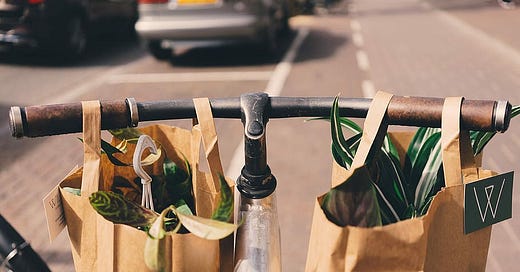Paper or plastic? Or cotton? Or something else entirely?
As people strive to be more sustainable and environmentally conscious, grocery bags have come under intense scrutiny. It seems ridiculous to use a new plastic bag every time we have to carry our groceries for a few minutes. Plus we’ve all seen them blowing around as street litter (à la “Firework” by Katy Perry) or floating in the ocean for some unfortunate sea turtle.
Over the past few years, several states have issued bag bans, eliminating plastic bags from grocery stores or charging a fee for new shopping bags. People are relying more heavily on paper or reusable cotton bags, and plastic grocery bags are on their way to becoming obsolete.
It seems like a leap forward for sustainability, but is it really the best choice for the planet? In order to find out, we need to dive into the life cycle of each bag material.
A life cycle assessment, or LCA, is a method that analyzes the environmental impact of a material or product from its inception all the way to its disposal. Sometimes known as “cradle-to-grave” analysis, it’s a great way to get a complete understanding of a product’s environmental consequences.
Many studies have used LCAs to analyze plastic, paper, and cotton shopping bags, comparing the water use, carbon emissions, disposal risks, and reusability of the different materials.
Of the two traditional single-use bag options, paper grocery bags require anywhere from 9 times1 to 25 timesmore water, 4 times more energy, and produce more waste per unit than plastic bags. Paper bags also weigh more than plastic, and therefore contribute more CO2 emissions during transportation.
These statistics actually make paper bags the less energy-efficient, and less sustainable, option when compared to plastic bags – a fact that surprised me the first time I heard it.
However, paper bags are biodegradable and recyclable, whereas plastic bags are not, and they produce much less toxic chemical waste during decomposition.
But once sustainability entered the zeitgeist, people began moving away from single-use grocery bags entirely. Tote bags became ubiquitous and businesses like Glossier and Reformation started giving them out free with purchase. If you wanted to be cool and environmentally-conscious, you walked into your local Trader Joe’s with a cotton tote slung jauntily over your shoulder.
Unfortunately, cotton tote bags require more water and energy to produce than either paper or plastic grocery bags. A study from 2018 even estimated that an organic cotton tote needs to be used daily for over 50 years to offset emissions from its production. Additionally, although cotton is biodegradable and compostable, most composting facilities won’t accept textiles, dooming all of those trendy tote bags to the landfill.
So what should we use???
A life cycle assessment of grocery bags in Singapore1 found that the most sustainable grocery bags are actually the thicker, structured, reusable plastic bags now sold at many grocery stores.
These bags, usually made from HDPE or polypropylene, are more durable, long-lasting, and easily recycled than their flimsy counterparts. They combine the lower energy and emissions of plastic bags with the resilience of reusable totes.
If you’re struggling between paper and plastic at the checkout line, these more durable bags might be a great option, but ultimately, the most sustainable bag is the one you already have. Don’t opt for a new, “more sustainable” bag if you already have one of your own.
If you have traditional plastic or paper grocery bags, don’t let them be single-use! Continue using them for groceries, errands, organization, and trash and recycling liners. You can even donate them to your local food bank.
If you have an abundance of cotton totes, put them to work! They’re great for school bags, purses, storage, and even picnicking, in addition to grocery shopping.
As always in sustainability, avoid introducing new products or materials into the system. The most environmentally friendly item is the one you already own.
So….paper or plastic? I don’t think it really matters as long as you continue to reuse it.
Ahamed, A., Vallam, P., Shiva Iyer, N., Veksha, A., Bobacka, J., and Lisak, G. (2021). Life cycle assessment of plastic grocery bags and their alternatives in cities with confined waste management structure: A Singapore cast study. Journal of Cleaner Production. 278. https://doi.org/10.1016/j.jclepro.2020.123956



